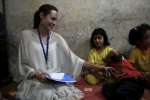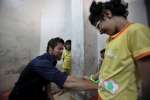Debt a growing burden for Syrian refugees in Lebanon
News Stories, 20 November 2015
BEIRUT, Nov 20 (UNHCR) – Syrian father Mohamad believes his life can be summarized by a worn out piece of paper. Carefully folded and tucked under a floor mattress, it details a growing list of debts.
Four years in Lebanon as a refugee have sucked his resources dry, and thrown him on the mercy of a good number of neighbours, relatives and friends.
"I wake up thinking about it. I go to bed thinking about it," the father-of-four said with his eyes fixed on the floor. "What can I say, we have lost everything, and now we are being forced to give up our dignity."
Mohamad's story is far from unique. Nearly 90 per cent of Lebanon's over one million Syrian refugees are today trapped in a vicious cycle of debt, according to the findings of a recent assessment of Syrian refugee vulnerability in the country by UNHCR, UNICEF and WFP.
Most refugees have not managed to free themselves from borrowings that started to pile up in 2014. Mohamad, who used to work as a truck driver in Syria until his home in Daraa was destroyed, is one of them.
He burned through his savings of US$1,150 in just four months in Lebanon. Forced to borrow, he found that he was still unable to cover the rent, which is now five months overdue.
Among thousands of other Syrians in the same situation is Fouad, who fled to Lebanon two years ago with his family after a shell flattened their home in the western city of Idlib.
Unable to work, and with no savings to sustain him, he explained in a UNHCR video that he now owes US$750 in back rent for a tent – the only shelter the family have – and US$300 for other items, including food.
"Yesterday, the landlord sent us a list with the names of those who owe him rent. He told us we have to pay. He is patient, but he said we need to pay before the end of the year," he said.
The survey was based on an assessment of more than 4,000 refugee households and over 100,000 family visits this year. It found that nearly 40 per cent of refugees are now in debt to their landlords, and many are more than two months in arrears. Thirty-nine per cent of those surveyed said they are also not getting medical care because of the high costs of treatment and drugs.
Refugees are coping by cutting the number of meals they eat each day, and reducing portion sizes, the survey found. Many still have to borrow money from shop owners, friends or relatives to feed their families. Meat is rarely consumed and eggs are eaten only once a week, at best. Many adults are eating less to make sure their children are fed.
Fouad, whose savings are long gone, finds that food vouchers are not enough to feed his family. "My heart aches for my kids. I always got them what they wanted. Now they crave bananas or an apple, we can't even afford a good meal."
The debt burden is compounded by the fact that refugees like Fouad and Mohamad are not allowed to work to support themselves and their families in Lebanon, and find they are unable to get by on aid provided by humanitarian agencies.
"Refugees have fallen in profound and difficult-to-overturn debt traps," said UNHCR's Representative in Lebanon Mireille Girard. "They cannot work, the assistance that humanitarian agencies provide is not nearly enough, and four years into the crisis, their support systems have weakened terribly. They are absolutely desperate."
By Dana Sleiman in Beirut











































